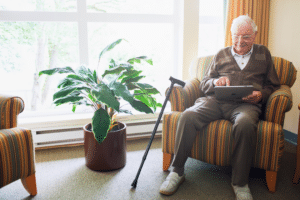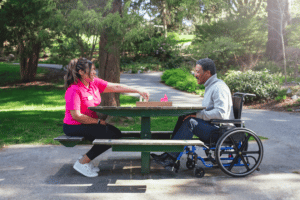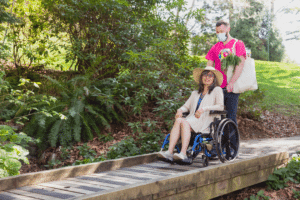Overcoming Senior Loneliness: A Comprehensive Guide
As we progress through the different stages of life, mental wellness and social connections become increasingly critical for our overall health, especially in our later years. Unfortunately, senior loneliness and social isolation are often overlooked as serious public health risks affecting a significant number of older adults. The physical health implications of chronic loneliness among the elderly can be as severe as those caused by smoking or obesity, and they include heart disease, cognitive decline, and even premature death.
In the United States, about a third of seniors live alone, and many report feelings of loneliness. A staggering 6.5 million American seniors are believed to be experiencing loneliness and depression. This alarming intersection between senior loneliness and mental health issues necessitates thoughtful discussion, understanding, and proactive solutions.
Furthermore, the National Academies Press has highlighted that social isolation and loneliness in older adults are associated with an increased risk of premature death from all causes. This includes a higher risk of developing chronic medical conditions such as heart disease.

Understanding the Impact of Social Isolation and Loneliness on Seniors
Social isolation and loneliness are serious issues affecting many older adults. Simply put, social isolation occurs when seniors don’t have enough contact with family, friends, or community. On the other hand, loneliness is the sadness that comes from feeling isolated. Both social isolation and loneliness can lead to big health problems for seniors.
The National Academies have pointed out that being lonely or socially isolated can be as bad for your health as smoking 15 cigarettes a day. That’s a big deal! This is because these issues can lead to major health risks such as heart disease, memory problems, and depression.
Why might an older person become socially isolated or feel lonely? There are several reasons. For example, retiring from work can mean less social interaction. Sometimes seniors lose friends or family members, and they might not get out much if they have trouble moving around. All these things can make seniors feel cut off from the world.

Depression in seniors might look different than in younger people. Instead of looking sad, older people might be grumpy or very tired. They might also have trouble sleeping, eating too much or too little, or struggle to focus on things. Sometimes, they even have physical problems like heart issues. What’s more, feeling lonely can make it hard for seniors to think clearly.
It’s really important that the people around seniors pay attention and help out. Family members, friends, caregivers, and doctors have a big part to play in this. They need to be on the lookout for signs that an older person is lonely or depressed and try to help them stay connected with others.
Senior centers are great places that can help make more social relationships. They offer programs where seniors can exercise, make friends, and find helpful services that make their lives better.
On top of that, we need plans on a bigger scale to make sure that older adults don’t feel left out. This means making sure they have chances to mix with others, have good relationships, and can easily get to community services that help them stay happy and healthy.
In short, being socially connected and having friends are as important as taking medicines for seniors. It’s crucial for everyone to pitch in to make sure that older adults don’t have to face loneliness and can lead a joyful life.
Turning the Tide: Addressing Loneliness Among Seniors and Fostering Wellness
Loneliness among seniors can often spiral into deeper issues, affecting their health and quality of life. Understanding the roots of this loneliness and implementing strategies to foster social connections are paramount.
🌼 Grasping the Cycle: Seniors often experience a narrowing social circle as loved ones relocate or pass away. This reduction in social interaction can be the starting point of loneliness and its associated challenges.
🌼 The Health Impact: Loneliness isn’t just an emotional state; it has real health consequences. For seniors, especially those with pre-existing conditions, the stress of loneliness can exacerbate health issues, leading to depression or even cardiovascular problems.
🌼 Reduced Activity: When loneliness sets in, seniors may not have the motivation to engage in activities they once enjoyed. This decline in physical activity is detrimental to their health and well-being.
🌼 The Need for Proactive Support: Seniors living alone might not have someone to prompt them to address potential health issues. Without a support system, they might neglect minor symptoms that could escalate into major health problems.
🌼 Increased Medical Attention: As health deteriorates, seniors may find themselves requiring more frequent medical care. While necessary, an uptick in doctor visits also signifies a decline in overall wellness.

So, what steps can we take to support the seniors in our community?
🌼 Engage and Connect: Simple gestures matter. Make an effort to visit, call, or communicate with the seniors in your life. Knowing that someone cares can have a significant impact on their mental and emotional state.
🌼 Encourage Community Participation: Community centers offer a plethora of activities and social events for seniors. Encouraging seniors to participate can help them forge new friendships and stay active.
🌼 Comprehensive Healthcare: Healthcare providers need to take a holistic approach when dealing with senior patients. This includes understanding their social situation and helping to connect them with resources that can enhance their quality of life.
Nurse Next Door’s Happier Aging™:
A Breakthrough Approach to Combating Senior Loneliness and Fostering Social Connections
Recognizing the imperative need to address loneliness and social isolation among older adults, Nurse Next Door has developed a groundbreaking approach named Happier Aging™. This approach is centered around enhancing social connectedness and positive relationships among seniors, which are vital in reducing feelings of loneliness and social isolation.
The principles driving Happier Aging™ – Choice, Purpose, Respect, Autonomy, and Belonging – are carefully designed to meet the unique needs of older adults, including those who have chronic loneliness or are experiencing loneliness due to social isolation.
By emphasizing what seniors love to do and assisting them to engage in these activities, Happier Aging™ aims to transform the later years into a period of joy and fulfillment. The approach incorporates facilitating social interactions, rekindling hobbies, or simply providing companionship. Nurse Next Door’s caregivers are integral in ensuring seniors never feel lonely or unsupported by engaging them in meaningful interactions.

Home Care: The Gentle Hand in Alleviating Loneliness
Home care services serve as a gentle hand, steadily guiding seniors through the day. Nurse Next Door’s compassionate caregivers not only provide medical support but also bring companionship and meaningful interactions into seniors’ homes. This personal touch helps in alleviating loneliness and ensures that older adults feel valued and cared for in the cozy comforts of their home.
Implementing Strategies to Alleviate Senior Loneliness and Depression
There are various practical strategies that can be employed to mitigate feelings of loneliness and symptoms of depression in older adults:
Encourage Engagements and Hobbies
Promoting social integration through engagement in enjoyable activities can improve the mood and self-esteem of older adults. Engaging in hobbies such as tai chi, painting, gardening, or reading allows for self-expression, learning, and staying socially connected.
Leverage Technology for Social Connection
With technology, seniors can maintain contact with family members and friends, join virtual groups, or explore new interests. Video calls and even virtual reality experiences can bridge the gap and reduce the feeling of isolation.
Foster Family and Community Support
Regular contact and emotional support from family and community are essential. Local resources such as senior centers provide an avenue for social contact and physical activity, which are imperative in healthy aging.
Include Pets in the Care Plan
Pets can be a great source of companionship for seniors who live alone. The unconditional love and bond shared with a pet can significantly reduce stress, lower blood pressure, and improve mood.
Seek Assistance from Health Care Providers
Comprehensive care for seniors should include screening for social isolation and its related health risks. Health care providers can also guide seniors and their family caregivers in accessing services and interventions, like respite care for family caregivers, designed to improve social connectedness and overall well-being.
In conclusion, understanding and tackling the multifaceted nature of senior loneliness and social isolation is crucial. Addressing these issues calls for a unified, community-driven approach that’s anchored in empathy, awareness, and the implementation of efficient strategies. By fostering social connections and embracing a support network, we can significantly enhance the overall quality of life for our esteemed older generations.
Discover how Nurse Next Door’s services can play a vital role in alleviating loneliness for your loved ones. Don’t hesitate to reach out to us at +1 (877) 588-8609 to schedule a complimentary caring consultation.
Together, let’s build bridges and fortify the support system for the seniors in our lives.

